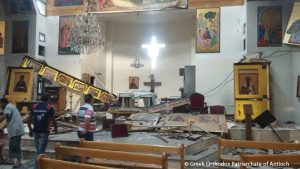 On Sunday 22 June an Islamist suicide bomber attacked the Greek Orthodox Church of Mar (Saint) Elias in the Dweila neighbourhood of Damascus during evening mass, killing at least thirty people and injuring up to ninety.
On Sunday 22 June an Islamist suicide bomber attacked the Greek Orthodox Church of Mar (Saint) Elias in the Dweila neighbourhood of Damascus during evening mass, killing at least thirty people and injuring up to ninety.
The attack began when a suicide bomber armed with an automatic weapon entered the church building, started shooting and then detonated an explosive belt, killing himself as well as members of the congregation. Some reports say he was accompanied by one or two fellow jihadists. The blast occurred at the entrance to the building and injured passersby as well as those attending the packed service. The blood-spattered interior of the building was badly damaged, with many pews scattered and covered in broken glass.
The official Syrian press agency SANA stated, “A suicide bomber affiliated with the terrorist organisation ISIS entered St Elias Church, opened fire, and then detonated himself with an explosive vest. The initial information indicates that a number of civilians were killed and others were injured. Security units rushed to the scene, cordoned off the entire area, while the competent teams began collecting evidence and investigating the circumstances of the attack.”
International Christian Concern reported that parish priest Father Youhanna Shehata courageously assisted in carrying more than twenty bodies following the blast, and said he estimated that between 350 and 400 Christians were in the church building at the time. In the aftermath of the attack an Open Doors source said, “the hospitals are full”. Meanwhile, Syrian police closed all churches in the region due to fears of further violence.
Syria’s interim president Ahmad al-Sharaa described the attack as “heinous” in an official statement and promised to bring those connected with it to justice. The authorities subsequently arrested six people linked to the atrocity.
Syria’s foreign ministry described the attack as “a desperate attempt to undermine national coexistence and to destabilise the country“, while Interior Minister Anas Khattab said, “These terrorist acts will not stop the efforts of the Syrian state in achieving civil peace.” He added that specialised teams had begun investigating.
Secretary-General Ahmed Aboul Gheit of the Arab League also condemned the attack and said he hoped “that the Syrian government will be able to deal with these terrorist organisations“.
Greek Orthodox Patriarchate issues statement
The Greek Orthodox Patriarchate of Antioch and All the East issued a statement denouncing the attack, in which it said: “On the day our Antiochian Church commemorates all the Antiochian saints, the treacherous hand of evil struck this evening, claiming our lives along with the lives of our loved ones who fell today as martyrs during the evening liturgy at St Elias Church in Dweila, Damascus.
“According to the preliminary information available to us at this time, an explosion occurred at the entrance of the church, resulting in the death of many martyrs and injuring others who were inside and around the church… the Greek Orthodox Patriarchate of Antioch and All the East strongly condemns this heinous act and denounces in the strongest terms this horrific crime. The Patriarchate calls on the authorities to assume full responsibility for what has occurred and continues to occur in terms of violations of the sanctity of churches, and to ensure the protection of all citizens.”
Background
Syria’s Christian community was shocked by the deadly attack, the first of its kind since Islamist rebel forces ousted former president Bashar al-Assad in December 2024.
Interim government leader Ahmed al-Sharaa has said he is committed to tolerance and a rejection of violence, stating that Christians and other religious minorities including Druzes and Alawites (Muslim minority sects that Sunni jihadists consider heretical) need not fear but will be able to live safely under its rule. However, Middle East Concern reports that attacks on Alawite communities in coastal areas of Syria in March left Christians fearing that they too might be targeted. In May, Syrian authorities said they had arrested members of an Islamic State (IS) cell near Damascus, whom they accused of preparing attacks.
IS seized large swathes of Syrian and Iraqi territory following the start of civil war in 2011, in a bid to establish a caliphate. It was territorially defeated in 2019, but pockets of IS fighters remained a threat and there have been concerns that they might take advantage of the recent transition to mount attacks.
Read Church in Chains’ Syria Country Profile.
(Aid to the Church in Need, Asia News, BBC, International Christian Concern, Middle East Concern, Mission Network News, Open Doors, RTÉ)
Photo Credit: Greek Orthodox Patriarchate of Antioch (via Aid to the Church in Need UK)
